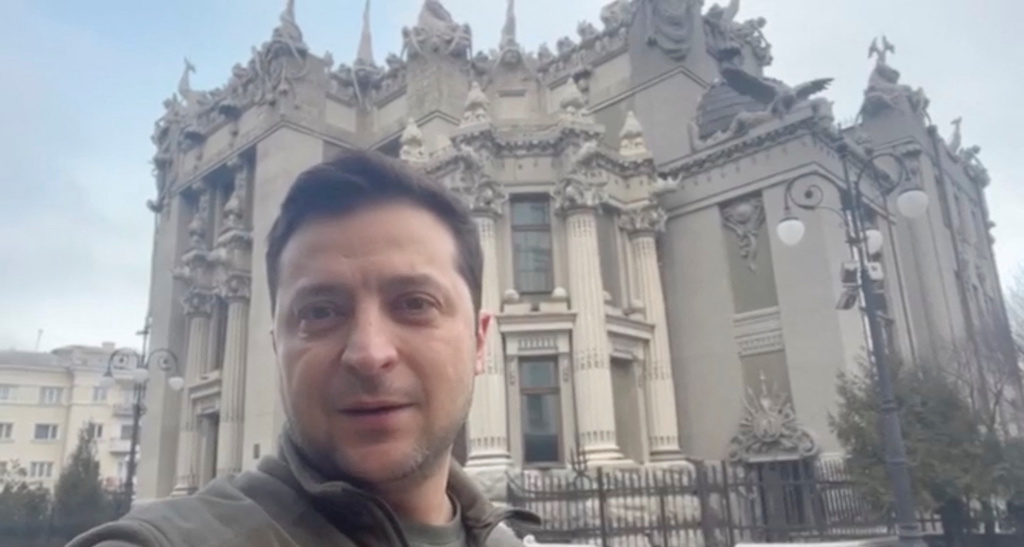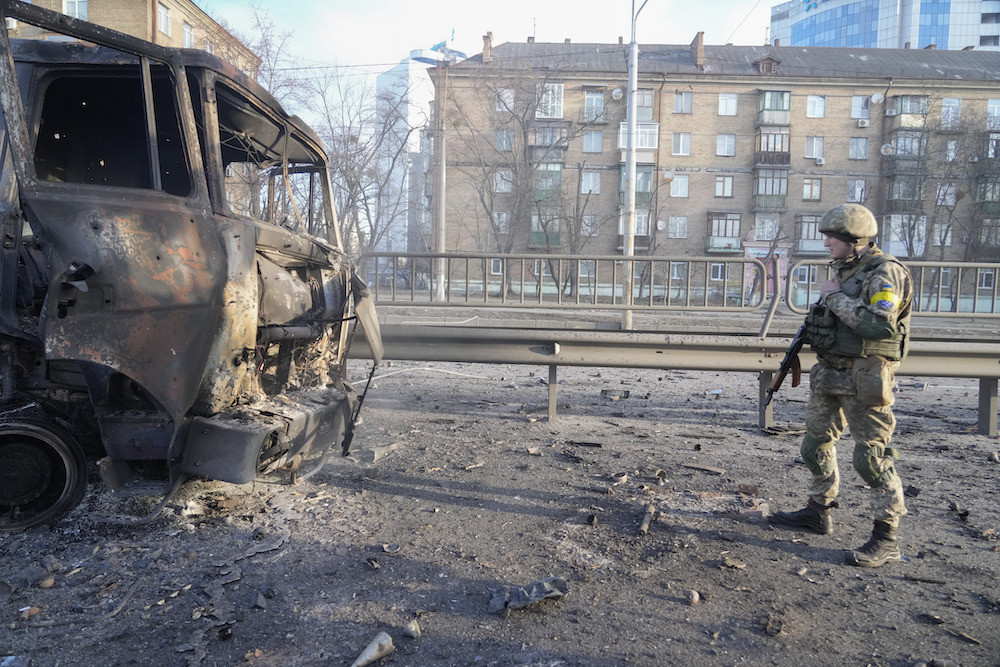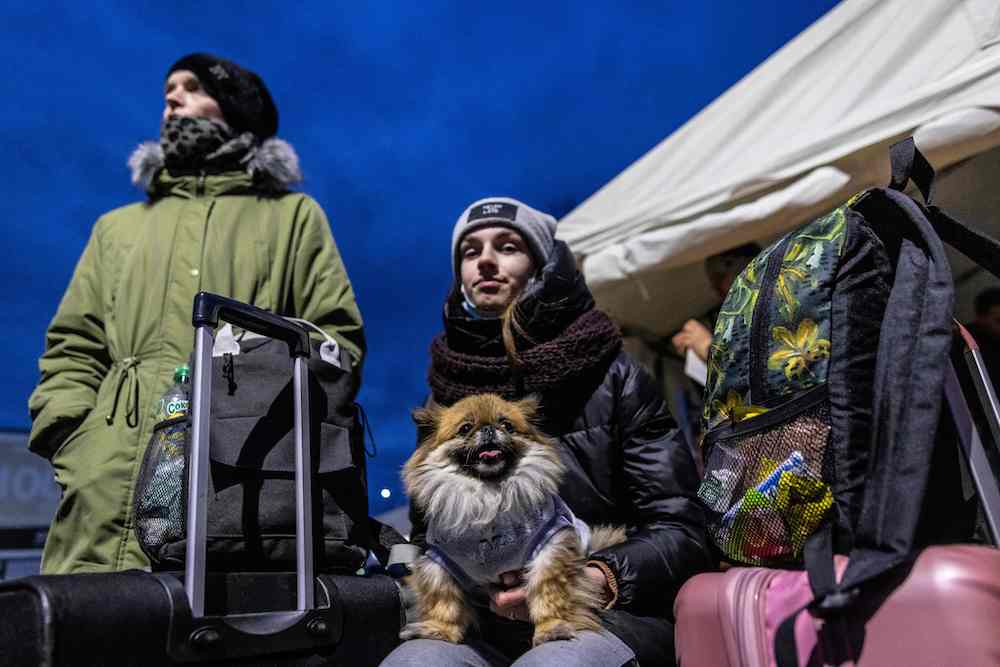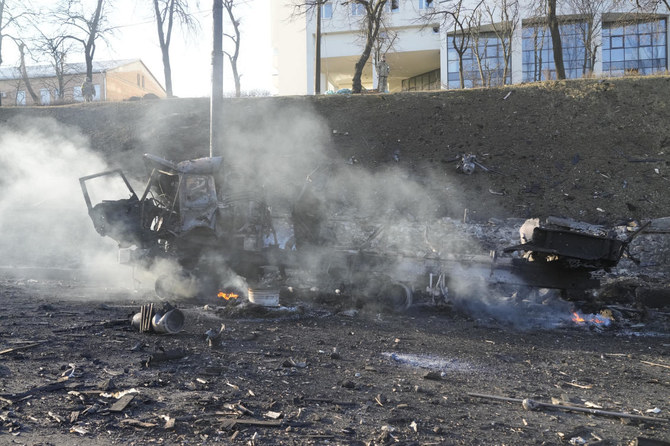LONDON: The UN Security Council is due to vote on Sunday to call for a rare emergency special session of the 193-member UN General Assembly on Russia’s invasion of Ukraine, which would be held on Monday, diplomats said.
The vote by the 15-member council is procedural so none of the five permanent council members — Russia, China, France, Britain and the US — can wield their vetoes. The move needs nine votes in favor and is likely to pass, diplomats said.
The request for a session on Ukraine comes after Russia vetoed on Friday a draft UN Security Council resolution that would have deplored Moscow’s invasion. China, India and UAE abstained, while the remaining 11 members voted in favor.
The US and allies are seeking as much support as possible to show Russia is internationally isolated.
UN Secretary-General Antonio Guterres spoke with Ukraine’s President Volodymyr Zelenskiy on Saturday, telling him the world body plans to “enhance humanitarian assistance to the people of Ukraine,” a UN spokesperson said.
“He informed the President that the UN would launch on Tuesday an appeal to fund our humanitarian operations in Ukraine,” the UN spokesperson said in a statement.

Ukrainian President Volodymyr Zelenskiy addresses Ukrainians in Kyiv, Ukraine, February 26, 2022 in this screengrab obtained from a social media video. (Instagram/@zelenskiy_official/via Reuters)
UN aid chief Martin Griffiths said on Friday that more than $1 billion will be needed for aid operations in Ukraine over the next three months as hundreds of thousands of people are on the move after Russia invaded its neighbor.
EU foreign ministers will also hold talks on Sunday in an effort to respond to the urgent calls by Kyiv to beef up military support and toughen sanctions on Russia.
EU foreign policy chief Josep Borrell tweeted that the foreign ministers will hold a video conference at 1700 GMT on Sunday, the fourth day of Russia’s devastating invasion of Ukraine that has already seen President Vladimir Putin personally targeted by sanctions.
The meeting will be “to adopt further measures in support of Ukraine, against aggression by Russia,” Borrell said.
“I will propose a package of emergency assistance for the Ukrainian armed forces, to support them in their heroic fight,” he added.
I spoke today with @ZelenskyyUa and conveyed the determination of the @UN to enhance humanitarian assistance to the people of Ukraine.
Respect for international humanitarian law and the protection of civilians are now paramount.
— António Guterres (@antonioguterres) February 26, 2022
The surprise call for the emergency discussions came shortly after Germany lifted its opposition to limiting Russia’s access to the SWIFT interbank system, a major request from Ukraine.
And in another dramatic U-turn, Germany also approved weapons deliveries for Kyiv, reversing a longstanding policy of banning weapons exports to conflict zones.
This came in the wake of pledges from across Europe of military aid to Ukraine and the singling out of Germany by Poland for not following suit.
Ukraine’s wish list to Germany, seen by AFP, includes mid-range anti-aircraft rocket systems, anti-drone rifles, microwave destruction systems and munitions.
Beyond military support and although not officially on the agenda, diplomats said ministers will certainly address the possibility of tightening the sanctions noose further on Russia.
Zelensky has repeatedly asked the EU to ban Russia from the SWIFT system, a sanction that has already had devastating effects against Iran when it was punished over its nuclear program.
SWIFT’s messaging system allows banks to communicate rapidly and securely about transactions, and cutting Russia off would cripple its trade with most of the world.

A Ukrainian soldier walks past debris of a burning military truck, on a street in Kyiv, Ukraine, Saturday, Feb. 26, 2022. (AP)
Italy, Hungary and Cyprus were also opposed to the SWIFT ban, but have come around to the idea in the face of international outrage against Russia’s invasion of its neighbor.
Separately on Saturday, the United States announced $350 million in aid to Ukraine, totaling $1 billion in security assistance since President Joe Biden took office. The additional aid includes “anti-armor, small arms and various munitions, body armor and related equipment,” said John Kirby, the Pentagon press secretary. A senior defense official said the assistance, which includes Javelin anti-tank weapons, will be delivered to Ukraine in phases and as soon as possible. The official spoke on condition of anonymity to discuss internal planning.
EU finance ministers on Saturday tasked the European Commission and European Central Bank to map out the potential consequences of a SWIFT ban, with officials fearing unforeseeable knock-on effects to the EU’s economy.
The first discussion about new sanctions follows quickly on a previous round of measures that only came into effect late on Friday.
These included asset freezes for Putin and Russian Foreign Minister Sergei Lavrov, curbs on the ability of Russians to bank in the EU and a tightening of existing travel bans.

Ukrainian refugees arrive from the Medyka pedestrian border crossing, in Przemsyl, eastern Poland on Feb. 26, 2022, following the Russian invasion of Ukraine. (AFP)
Meanwhile, pro-Ukraine demonstrations erupted across the world on Saturday, as thousands took to the streets from London to New York to Tehran to denounce Russia’s assault on its neighbor.
ON the ground, Zelenskiy said Ukrainian forces were repelling Russian troops advancing on Kyiv on Saturday, as Western nations announced they were shipping more weapons to help the country’s outgunned military.
Reuters witnesses in Kyiv reported occasional blasts and gunfire in the city on Saturday evening, but it was not clear exactly where it was coming from. The capital and other cities have been pounded by Russian artillery and cruise missiles.
A US defense official said Ukraine’s forces were putting up “very determined resistance” to the three-pronged Russian advance that has sent hundreds of thousands of Ukrainians fleeing westwards, clogging major highways and railway lines.
Dragging suitcases and carrying children, tens of thousands of Ukrainians rushed to the borders Saturday as invading Russian troops pressed on with their march toward Ukraine’s capital of Kyiv.
At least 150,000 people have fled Ukraine into Poland and other neighboring countries in the wake of the Russian invasion, the UN refugee agency said Saturday.
The agency expects up to 4 million Ukrainians could flee if the situation deteriorates further.
(With AFP, Reuters and AP)
























